
|
Government revenue has been negatively affected by the stronger Namibian dollar exchange
rate and adverse conditions in the primary sector
Primary sector activities (agriculture, fishing and mining) dominate economic activity in Namibia. As a result government revenue depends largely on taxes on the profits of companies operating in these sectors. In 2003 various factors negatively impacted on the value added in primary sectors activities.
The agricultural sector was subjected to widespread drought and lower beef prices. In addition, the stronger Namibian dollar exchange rate eroded export proceeds.
While the fishing industry showed signs of recovery in 2003, operating conditions remained tough. Total Allowable Catches were under pressure while the stronger exchange rate also impacted on export revenue.
As with other export sectors mining sector value added was negatively affected by the stronger currency as export proceeds dwindled. In addition, value added in this sector was dealt a blow by the closure of the NAMCO Diamond Mining Company.
Secondary sector value added remained underdeveloped and was, as a result, unable to absorb the losses incurred by the primary sector.
Certain tertiary sector activities performed better, most notably "wholesale and retail trade" and "transport and communication", which benefited from lower domestic interest and inflation rates in Namibia and South Africa. In contrast the stronger exchange rate impacted negatively on the earnings of other services industries, especially tourism.
The overall impact was a further slowdown in government revenue while expenditure remained strong. As a consequence budget deficits remained large while debt levels grew.
|
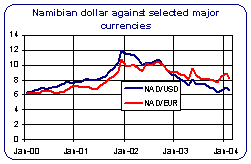
|
Highlights
-
Economic growth of 3.1% is estimated for 2003. The economy is forecast to grow by 3.8% in 2004
-
Revenue negatively affected by stronger Namibian dollar exchange rate against USD and other major currencies.
This trend is expected to continue while the Namibian dollar remains strong on international foreign exchange markets.
-
Strong expected SACU receipts in 2004/05 should support revenue. However, this is not sustainable.
-
Growth in expenditure is forecast to slow to 3.67% in 2004/05 from 7.4% in 2003/04.
-
Budget deficit is forecast to shrink to 1.57% of GDP in 2004/05 from the revised 4.15% of GDP in 2003/04.
(Given the tendency to pass additional budgets, it is likely that the deficit will be revised upwards later in 2004
-
Government debt rose sharply in 2003/04 and is expected to rise further in 2004/05.
-
Pensions are increased by NAD50 to NAD300.
-
No changes have been made to taxes on individuals and corporates. VAT has remained unchanged.
-
Taxation on interest earned by Namibian financial institutions and taxpayers on South African investments has been removed.
-
No exchange control amendments have been announced.
-
Land taxes should become reality in this fiscal year.
-
Initiatives have been announced to clamp down on tax evaders
|
|
|
2004/05 Budget proposals
Revenue and grants
Total revenues and grants for 2004/05 are forecast at NAD12.1bn, an increase of 11.7% over the 2003/04 revised budget estimate.
In 2004/05 tax revenue will continue to contribute 90% to total revenue with the remainder of revenue expected from non-tax income and to a lesser extent from grants and loans.
The increase in total revenue is projected from an 11.4% increase in tax revenue to NAD10.9bn. This strong increase is expected to be supported by an increase of 38.6% in
taxes on international trade (including revenue from the Southern African Customs Union (SACU)).
|
Non-tax revenue is expected to grow by 12.7% to NAD1.1bn in 2004/05 mainly on the back of an expected increase in entrepreneurial and property income and administration fees and charges.
|
|
|
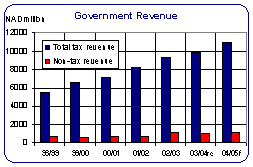
|
While remaining at low levels, a 44.5% expected increase in grants and loans on those received in 2003/04 should further support total revenue.
Expenditure and net lending
Total expenditure (including capital transfers, lending and equity participation) for 2004/05 is forecast at NAD12.69bn (3.7% above the revised NAD12.2bn for 2003/04) of which NAD10.52bn (82.9% of total) is earmarked for recurrent expenditure.
|
|
|
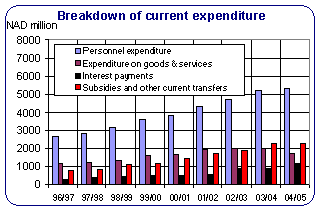
|
A total NAD1.6bn is proposed for capital expenditure in 2004/05 against the revised NAD1.36bn in 2003/04.
|
|
|
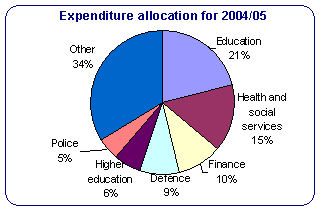
|
The budget makes provision for NAD366m to support Air Namibia and a further NAD91.2m for the State House building project.
Among the allocations education will receive the bulk of available resources followed by health and social services and finance. Defence will continue to receive a significant part of resources.
Overall balance
The outcome of the 2004/05 budget proposal will be a significantly smaller budget deficit of NAD589m (1.57% of GDP) with total revenues and grants of NAD12.1bn and total expenditures and net lending of NAD12.7bn.
According to the new three-year medium term expenditure framework the deficit is expected to reach 1.02% in 2006/07.
|
|
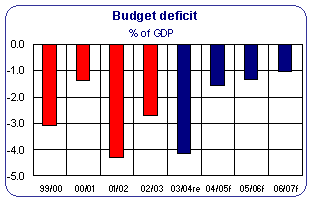
|
Government debt
Higher than forecast budget deficits and foreign loans for development purposes have caused a gradual increase in government debt. As a consequence debt servicing is increasingly demanding a higher share of current expenditure.
|
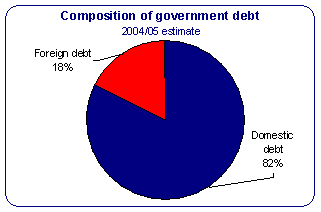
|
While Namibian debt levels are relatively low by international standards and largely domestic in nature, the sustainability of an increasing trend has been questioned inside and outside of Namibia. In reaction to this the
Namibian government imposed a limit on debt of 25% of GDP. In recent years this has however, not been attained and government debt is expected to rise as high as 31.96% of GDP in 2004/05, after the revised estimate for 2003/04 puts it at 30.34% of GDP.
|
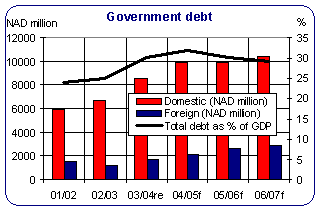
|
In order to arrest the increase in debt and debt servicing the Minister of Finance aims to limit the budget deficit to 1.3% of GDP on average over the medium term period. In the 2004/05 budget speech government announced additional initiatives under a
new Sovereign Debt Management Strategy to control debt. These include strengthening the institutional framework for debt management, monitoring loans made by parastatals and developing domestic financial markets.
Conclusion
While the signal of financial responsibility sent by Finance Minister Saara Kuugongelwa-Amadhila is commendable and much needed, Budget 2004/05 leaves one with a feeling of doubt. This doubt is mainly centered around whether the subdued expenditure forecast for the next three financial years and,
by implication, the significantly lower budget deficits are realistic.
These doubts are not unfounded given last year's (and some previous years') additional budget submissions. In the additional 2003/04 Budget, expenditure was largely maintained at original levels despite the fact that revenue fell short of expectations. It is therefore not unlikely that the budget
deficit may have to be revised later in 2004. If this does happen the debt forecast will also have to be adjusted upwards.
Significant changes to the budget deficit and debt ratios at a later stage will do more harm to the government's credibility than the good the temporary feel-good situation outlined by the Minister will accomplish. We do, however, share the Minister's sentiment about containing both the deficit and debt levels.
The Minister should be commended for sending such a strong signal of belt tightening in an election year.
In the longer-term government needs to increase its efforts to improve revenue collection, diversify its revenue sources and measure efficiency in spending in order to place government finances on a sustainable basis.
|
|
Standard Bank Economics Division research team
|
|
|
Iraj Abedian (PhD) - Director & Group Economist
(+27-11-636-2910) Abedian@standardbank.co.za
|
Kindly email Brenda.Landsberg@standardbank.co.za should you wish to be included on our research distribution list.
Do visit our web site http://ed.standardbank.co.za to view our most recent research or to access our archives.
|
Disclaimer
This document does not constitute an offer, or the solicitation of an offer for the sale or purchase of any investment or security. This is a commercial communication. If you are in any doubt about the contents of this document or the investment to which this document relates you should consult a person who specialises in advising on the acquisition of such securities. Whilst every care has been taken in preparing this document, no representation, warranty or undertaking (express or implied) is given and no responsibility or liability is accepted by the Standard Bank Group Limited, its subsidiaries, holding companies or affiliates as to the accuracy or completeness of the information contained herein. All opinions and estimates contained in this report may be changed after publication at any time without notice. Members of the Standard Bank Group Limited, their directors, officers and employees may have a long or short position in currencies or securities mentioned in this report or related investments, and may add to, dispose of or effect transactions in such currencies, securities or investments for their own account and may perform or seek to perform advisory or banking services in relation thereto. No liability is accepted whatsoever for any direct or consequential loss arising from the use of this document. This document is not intended for the use of private customers. This document must not be acted on or relied on by persons who are private customers. Any investment or investment activity to which this document relates is only available to persons other than private customers and will be engaged in only with such persons. In European Union countries this document has been issued to persons who are investment professionals (or equivalent) in their home jurisdictions. Neither this document nor any copy of it nor any statement herein may be taken or transmitted into the United States or distributed, directly or indirectly, in the United States or to any U.S. person except where those U.S. persons are, or are believed to be, qualified institutions acting in their capacity as holders of fiduciary accounts for the benefit or account of non U.S. persons; The distribution of this document and the offering, sale and delivery of securities in certain jurisdictions may be restricted by law. Persons into whose possession this document comes are required by the Standard Bank Group Limited to inform themselves about and to observe any such restrictions. You are to rely on your own independent appraisal of and investigations into (a) the condition, creditworthiness, affairs, status and nature of any issuer or obligor referred to and (b) all other matters and things contemplated by this document. This document has been sent to you for your information and may not be reproduced or redistributed to any other person. By accepting this document, you agree to be bound by the foregoing limitations.
Unauthorised use or disclosure of this document is strictly prohibited.
Copyright 2003 Standard Bank Group. All rights reserved.
|
|






